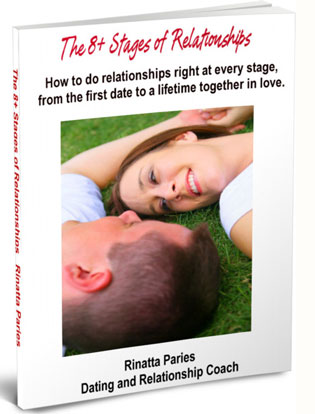 Want to instantly improve all your relationships, get more of what you want from your partner and feel good in the process? Let’s talk about appreciation as a way to get all of that!
Want to instantly improve all your relationships, get more of what you want from your partner and feel good in the process? Let’s talk about appreciation as a way to get all of that!
Try this: Thank someone for something they just did for you. Notice how you feel. Don’t you feel happier as soon as you delivered the message?Appreciation has a way of making you feel good while make the other person feel good as well!
By the way, unspoken appreciation feels good too, but doesn’t communicate to others and so is much less affective in improving relationships.
Appreciating others should be easy, and you would think, a natural thing to do. We are trained to say please and thank you when we are young, and from this, you would expect we would have appreciation as an automatic response when others do things for us.
Instead, appreciation often feels more awkward and uncomfortable than criticism, frustration or anger. Many men and women feel comfortable criticizing others, especially their intimate partners, yet feel wrong about showing appreciation. Even though showing appreciation may feel embarrassing, awkward, or silly, ignore your feelings! Any discomfort you may feel with showing appreciation is temporary and will go away when you see what it does for your relationships.
The reality is, criticism towards anyone you interact with is damaging to that relationship. If you’re going to feel awkward and uncomfortable, it should be about sharing criticism, blasting others with anger, or making demands on them. These are guaranteed to make both you and your partner unhappy.
On the other hand, appreciation never damages a relationship. Even in the most negative situation or a relationship full of conflict, appreciation can be used as a balm to smooth difficult situations, make the interaction tolerable, and create a more positive outcome.
We trust people who appreciate us and respond to appreciation with kindness and generosity. I encourage you to express appreciation even if it makes you feel uncomfortable, using the specific techniques I will share with you in a moment.
There are two more important reasons why it’s hard to appreciate others in general, and an intimate partner in particular:
- You may feel that the things your partner does for you should just be done. It feels strange to show gratitude for something that seems ordinary, or is a task or an obligation.
- When there are things in the relationship you have not gotten, it’s hard to be thankful for what you do get.
Even with these reasons, I still encourage you to appreciate your partner out loud. If appreciation is not something that comes naturally to you, then use it as a conscious technique, something you make yourself do, to improve all your interactions. Even used consciously, as opposed to naturally, appreciation will create positive effects in all your relationships.
However, never fake appreciation! Instead do this:
- Observe what your partner – or another person- is doing for you.
- Notice that it could be appreciated, if appreciation was easy for you.
- Appreciate, out loud, using the process I will show you below.
In order to work to improve all your relationships – and your primary relationship – appreciation must be done correctly. Here’s how to do appreciation right:
Firstly, show appreciation for the big things people do for you, but also appreciate the small, ordinary things. Appreciate the things you expect to be done and appreciate the things that should be done. Appreciate the things that happen on a daily basis. Appreciating ordinary things is when appreciation really shines as a powerful tool for improving relationships. This is because people are doing things for you constantly. As you start to notice these small actions, the people around you will feel seen, and, well, appreciated!
Formula for how to “do” effective appreciation:
What to appreciate:
Notice everything your partner – or anyone you are interacting with – does for you, or even does right.
What to say:
1. Start with “Thank you for”
2. Add the specific action or words you are observing the other person is doing or saying. The more specific you are, the more effective this act of appreciation will be.
3. Share how this action or words make you feel
4. Share why you feel that way, starting with “because when you do this” or “because when you say this”
Example: A friend’s husband brings her coffee in bed every morning. Here’s how her appreciating this would sound:
1. Thank you, honey, for
2. Bringing me coffee this morning and every morning.
3. This makes me feel happy
4. Because when you do this I know you love me and care about me
In order to become an effective and natural appreciator you need to practice conscious, on purpose appreciation not just in your closest relationships, but with everyone you interact with.
Here’s what the practice of appreciation might look like in ordinary life:
- Thank the clerk who takes your money in the grocery store by looking up, making eye contact, smiling and saying “Thank you.”
- Thank the person who lets you into a line of cars on the highway by smiling, waving and nodding your head at them.
- Thank the person whom you are behind, who opens and holds the door for you, by again looking up at them, making eye contact, smiling and saying “Thank you.”
These small gestures of conscious appreciation towards strangers allow you to practice appreciation and become a more appreciative person. This practice will open your heart and get you into the habit of appreciating things people do for you. You can then more easily actively show appreciation in your close relationships.
Appreciation is a fail-safe tool for relationship improvement. Use it and you will have better relationships, while feeling better about yourself at the same time.
[stextbox id=”red_box”]
What if:
- You can’t seem to find anything to appreciate about your partner?
- Appreciation is hard for you?
- You are mired in conflict with each other and appreciation is the last thing you want to do?
- What if you are single, and have no one to appreciate?
Come work with me in the Get Clarity Coaching Session to begin to solve these stumbling blocks to the kind of a relationship you want to have!
[/stextbox]
photo credit: woodleywonderworks via photopin cc
